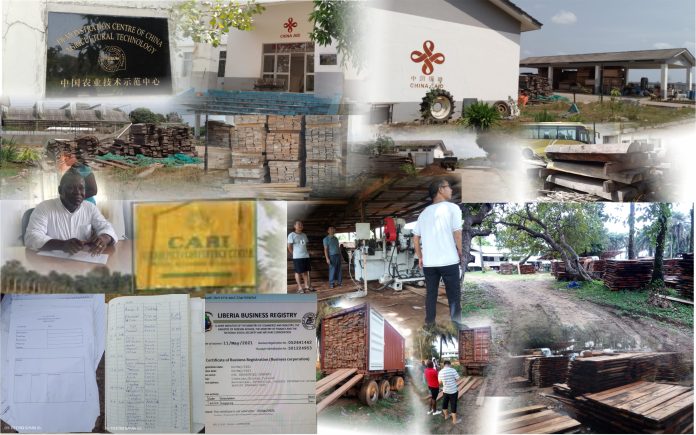Top: A poster exposing an illegal timber trafficking company that operated at CARI, abandoning a lot of wood there. The DayLight/Rebazar D. Forte
By Rebazar D. Forte
SUAKOKO, Bong County – Planks and wood machines are everywhere: near a nursery and on the basketball court, by an abandoned vehicle and even along an indoor corridor. The grayish coloring of the planks suggests that they have been here for a while.
This is not your regular sawmill. It is the Central Agriculture Research Institute (CARI) in Suakoko, Bong County, and the piles of timber are remnants of an illegal timber trafficking syndicate that operated here for several years.
Smugglers under the banner China Turkish Liberia Industries (CTL Industries) ran the secret sawmill for about three years, according to documents, members of the syndicate and people familiar with the illegal operation. Two Chinese men, Chaolong Zhong and Guoping Zhang; a Turkish man Mehmet Onder Erem; and a Liberian Terrence Collins, owned and ran the syndicate.
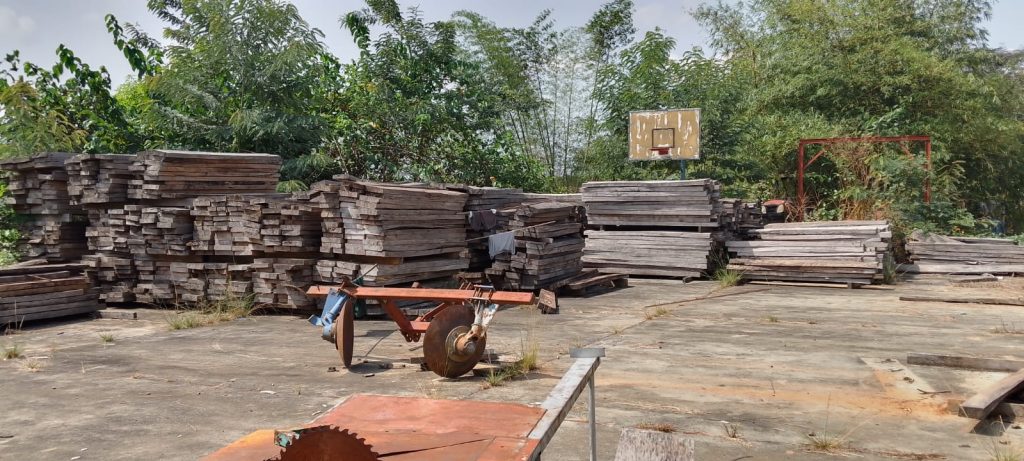
“They got over there with a different plan,” said Dr. James Dolo, the Officer in Charge of CARI, in a phone interview. “They said they wanted land to set up some demo and start some production… but those guys came and they started bringing logs in overnight.”
Mr. Chaolong has 35 percent of the company’s shares, Mr. Erem 20 percent, Mr. Collins 15 percent and Mr. Guoping 10 percent. The remaining 20 percent is outstanding, according to CTL Industries’ article of incorporation.
It was unclear whether Mr. Chaolong worked with China Aid, which collaborate with CARI as part of an agriculture program between Liberia and China. A ringleader of the group, he, however, apparently used his Chinese connections to set up the sawmill sometime in 2021, according to former a member of the syndicate. The source and other sources The DayLight interviewed asked not to be named for fear of retribution.
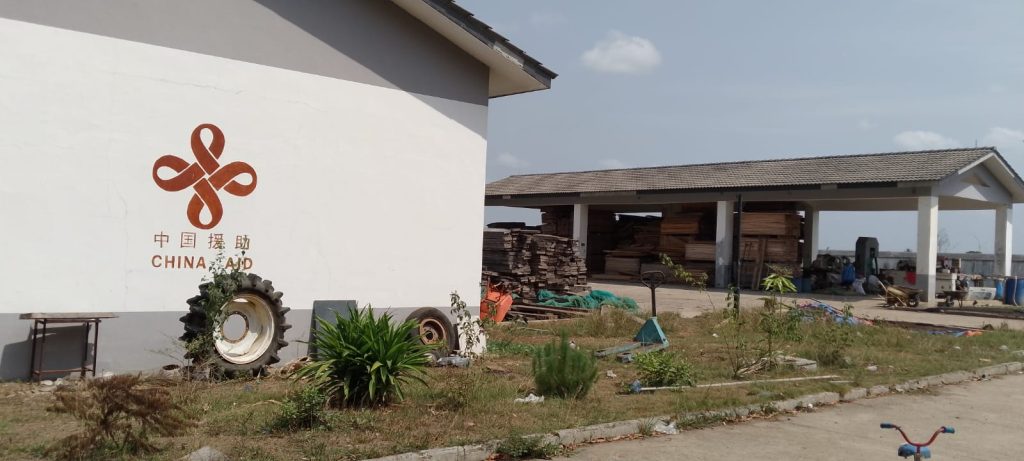
Mr. Erem operated and supervised CTL Industries’ machine works. “He used to operate the forklift most often,” said another former worker. The Turk’s involvement with the syndicate was cut short over a misunderstanding with Mr. Chaolong, the ex-worker said. Mr. Erem left CARI to start another operation but remains a shareholder of CTL Industries.
Mr. Collins, aliased TC, conducted all the paperwork for the syndicate. He secured all the company’s documents, including the article of incorporation and business registration.
CTL Industries is not Mr. Collins’ first illegal activity. In February, a DayLight investigation found his company Quezp operated two mines in Montserrado County without licenses. The EPA later fined the company for mining without an environmental permit.
Victor Sumo, the head of CARI at the time, was aware of the trafficking network and appeared to have benefited from it. Dr. Sumo and Mr. Chaolong would have problems with money. At one point, he stopped the operation in demand of his share of the money, according to the manager, corroborated by other people.
“Victor Sumo put a steel gate immediately after the main road coming to the Chinese building. Some money was playing in hands and timber was coming in and something was not going somewhere,” the staff said. “Some high government officials along with staff at CARI came and settled the matter between Dr. Sumo and CTL Industries.” Dr. Sumo did not return questions via WhatsApp for comments on this story and did not answer several phone calls this reporter placed to him.
Dolo claimed Dr. Sumo shuttered the entrance to China Aid to halt the operation, not for money. “So that’s how it stopped,” he said.
Three ex-workers refuted Dolo’s claims, saying the operations continued long after that episode. They said Sumo authorized Mr. Chaolong to reopen the operations and reclosed the gate in demand of US$10,000. They added that CTL Industries closed just before last year’s elections, promising to resume after the polls but deserted the operations.
‘Big trucks’
CTL Industries had at least 33 staff, based on the company’s roosters obtained by the DayLight. Workers enrolled timber on log sheets, showing wood size, quantity, quality and species.
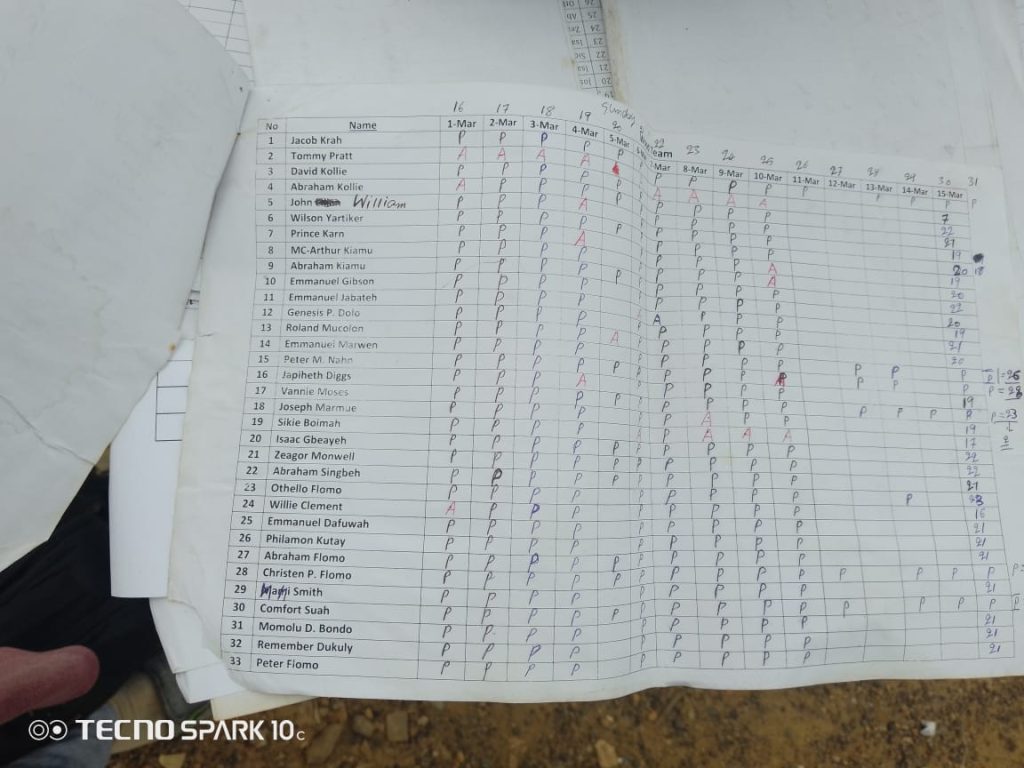
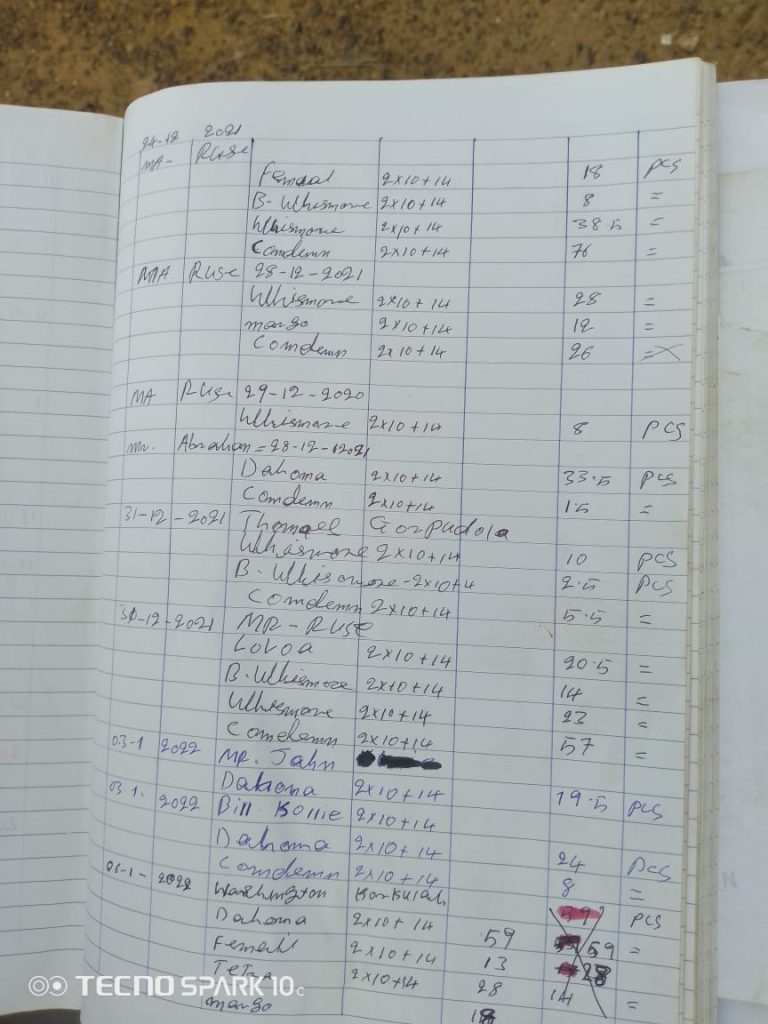
“When the woods came at the gate, we used to record the woods based on the type. If it is not in a good condition, we will record it as condemned, which means the buying price will not be the same,” said one ex-worker.
“Yellow big trucks used to come at night with woods and they used to pass through the second (exit) gate. The woods were taken from Lofa County, Bong and even Nimba,” the ex-worker said. A resident of Zorzor who is familiar with the forestry industry, and also preferred anonymity, said the same thing. The gate in question is now closed for use.
Another person knowledgeable about the operation added that woods were transported even during the day, suggesting the illegal operation was an open secret. The company also bought wood from local vendors and chainsaw millers in Suakoko.
The traffickers exported the timber in several containers, pictures The DayLight obtained reveal. Several pictures show timber being loaded into containers for export. Others show men, including an unidentified Chinese man, sealing up the metal boxes.
The export of the wood cements the cabal’s criminal profile. Exporting planks is prohibited in forestry, while chainsaw milling activities are restricted to Liberians. CTL Industries is registered in LiberTrace, the legal system to export timber from Liberia. However, it has not used the system before, LiberTrace’s record of the company shows.
The pictures reveal other things, too. They show that CTL Industries operated at another location before moving to CARI. One picture shows Mr. Chaolong and two unidentified Chinese nationals standing by a wood machine. Other pictures feature a house filled with timber in a yard. Tire impressions matching container trucks are seen on the driveway of the house.
One ex-worker said the house in the picture was where the company had operated on the Robertsfield Highway, adjacent to the Baptist Seminary. The company’s business registration certificate supports that location, which is Mr. Collins’ address, according to the company’s article of incorporation.
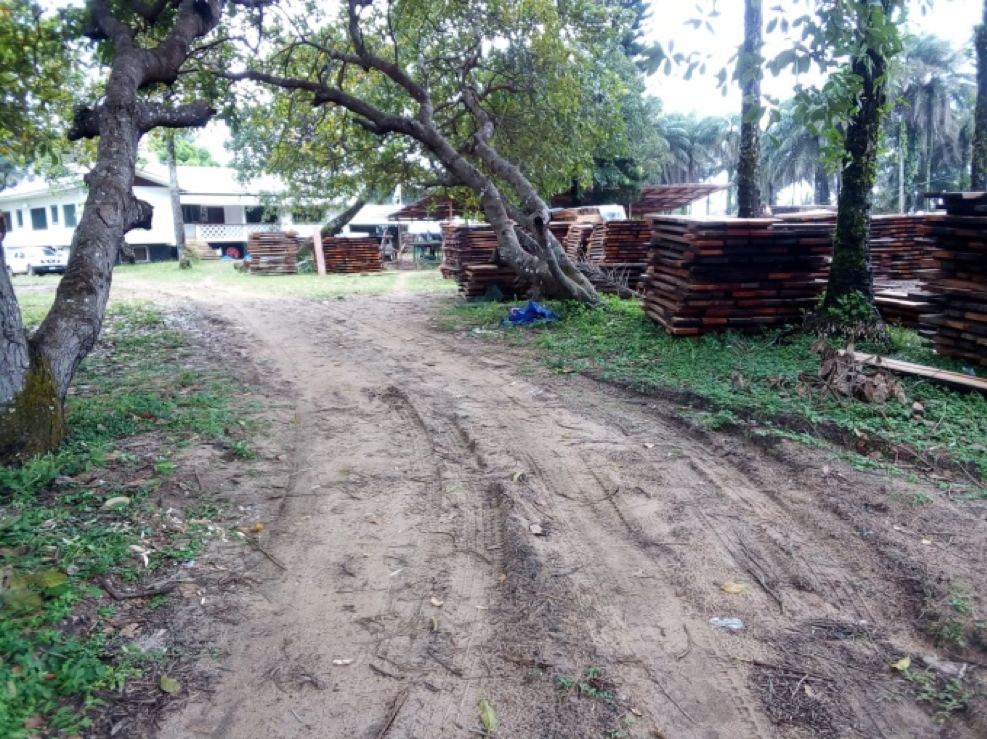
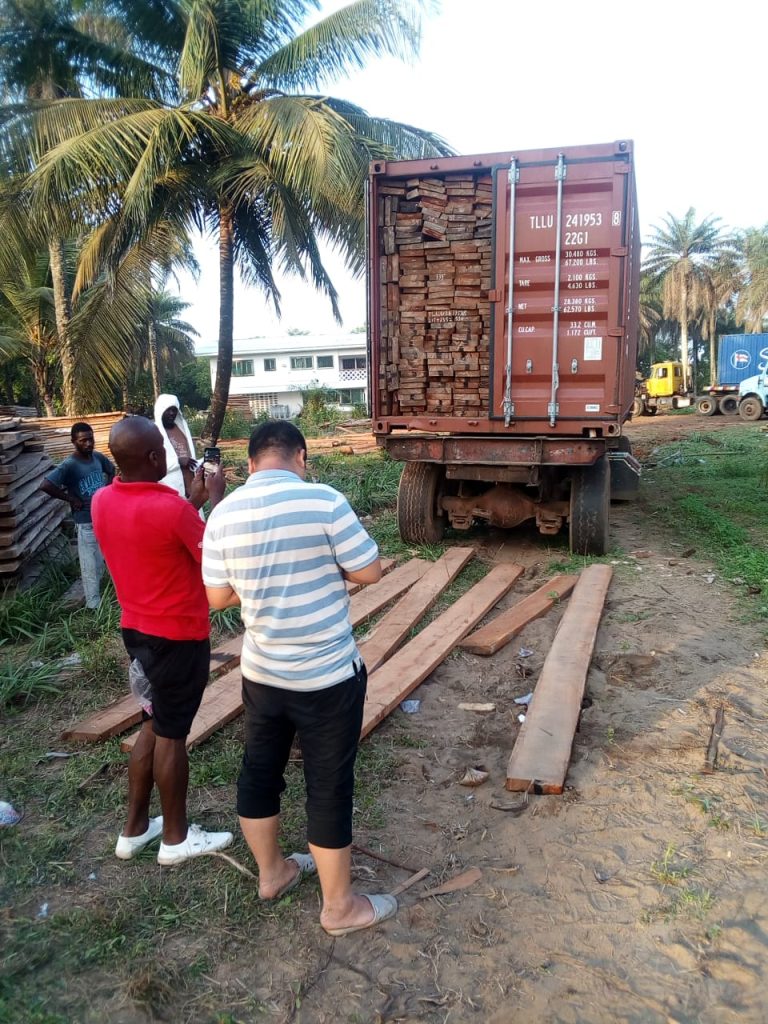
‘Selling vegetables’
The CARI-China Aid collaboration was established in 2009 for Liberian and Chinese scientists to conduct research. It was meant to train Liberian farmers to produce rice, corn and vegetables initially and fisheries and husbandry later. “It is a capacity-building project or a ‘fishing project’ that teaches people how to fish,” Zhou Yuxiao, then Chinese Ambassador to Liberia, said at its handover in 2010. The US$6 million project was part of Beijing’s efforts to promote agricultural technology in Africa.
CTL Industries’ activities overshadowed the work of China Aid, as the number of plant nurseries was dwarfed by the abandoned timber at CARI. Dolo said China Aid seemingly stopped operating either in 2013 or the following year.
One source said that the Chinese have turned the facility into a vegetable business, supplying Chinese restaurants, a claim Dolo appears to agree with.
“Right now the guys that are there if you visit the compound are only producing vegetables. I think they got this big program there. I think whatever they are doing with it I don’t know. Maybe they are selling it or supplying some,” Dolo said. The Chinese Embassy did not respond to The DayLight’s queries for comment on the China Aid program at CARI.
Dolo said his administration would investigate the CTL Industries’ activities. “I can’t attach a timeframe because it is a process…,” Dolo said, “but I can guarantee you that we are going to get on it by next month.
Efforts to interview Messrs. Chaolong and Collins did not materialize.
Mr. Chaolong did not respond to WhatsApp calls and messages. At one point, he answered a phone call and requested our reporter to text because he could not understand English. He did not respond to that message.
Mr. Collins referred The DayLight to speak with his lawyer Francis Tuan. Tuan did not return WhatsApp messages for his client.
The story was a production of the Community of Forest and Environmental Journalists of Liberia (CoFEJ).

